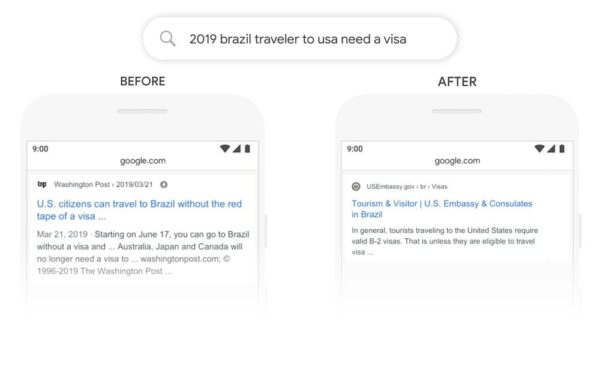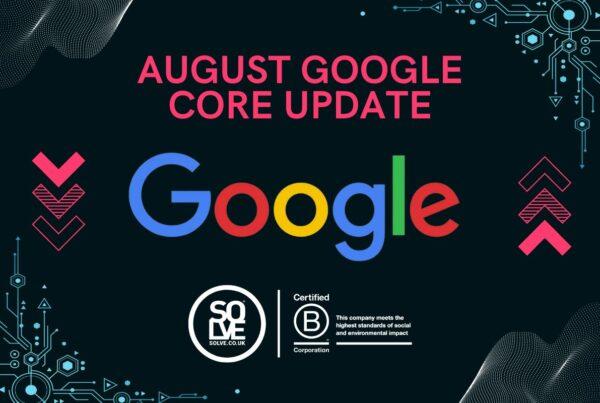
Introducing your new best friend, BERT
On 25th October, Google announced the rollout of their new algorithm, BERT. According to Google, BERT is:
“the biggest leap forward in the past five years, and one of the biggest leaps forward in the history of Search.”
And it could impact 1 in 10 of all search queries.
Before you panic too much, let’s explain exactly what BERT is and how it’ll work.

Image source: Pixabay
What is BERT?
BERT stands for Bidirectional Encoder Representations from Transformers (yeah, we prefer BERT too.) Bert was a muppet too, but this one sure isn’t. BERT’s quite a friendly character – he’s very understanding, not at all scary and very, very smart. He’s been developed to help Google’s computers understand language a bit more naturally like humans do.
How does BERT work?
BERT will allow Google to pick up on the nuances of language and context of words to interpret the intent of users better and provide them with even more relevant results, including on featured snippets.
Here’s an example from Google that illustrates exactly how it’ll work.

Image Source: Google
On a search query like “2019 Brazil traveller to USA need a visa”, the word “to” is critical to the meaning and user intent. Pre-BERT, Google would have focussed on words like “Brazil”, “traveller”, “USA” and “visa”, and provided users with results that talk about U.S. citizens travelling to Brazil, when actually the user is looking for the opposite. Thanks to BERT, when this search query is entered now, Google will only show results referring to Brazilians travelling to the USA.
When is BERT rolling out?
BERT is rolling out right now and will be fully live shortly.
Will BERT affect my ranking?
So if 10% of all queries will be affected by this update, should you be afraid your rankings will change?
It’s important to remember that BERT and any other algorithm updates are made to improve the relevance of the results provided to users. If you’re employing whitehat SEO techniques like optimising your site for relevant terms and posting the content that your target market wants to find, then an update like this should actually benefit your site.
Think of BERT like a friend. He’s there to hook you up and introduce you to the right people.
And if you’re rankings do drop for certain phrases, you need to question how relevant that phrase was for your business and if it converted into sales. It’s likely that any drops will be because that traffic source wasn’t the best fit for you. Your efforts would be better focussed on relevant terms.
How can I capitalise on BERT and can I do SEO for it?
Like we said, BERT is a really friendly guy. It’s his job to matchmake and get you the intros you need to grow your business, so you and BERT could be very good friends indeed. But you need to play your part too by posting quality, relevant content.
We advise all our clients to start any SEO strategy with sound keyphrase research. This allows you to create content and optimise your website for the terms that your target market is searching for. And you need to make sure that your content is top-quality, unique, informative and above all, written to add value to the user.
Given the nature of BERT, some believe it focuses more on informational queries like what is, how-to, etc. so answering questions and how-to guides are ideal types of content to be posting, but if you’re following our guidelines for top-ranking content, then you’re doing this already.
So although 1 in 10 queries are set to change as a result of BERT, we’re actually really excited. With this algorithm update, Google is rewarding good SEOs like us for keeping the user (or target market) at the heart of everything we do.
And in other news…
EAT is Important, But There’s No Specific Score
Google’s Gary Illyes confirmed at PubCon that there is no one specific algorithm or score for EAT. According to Marie Hayes’ report on the event, he said that “multiple algorithms conceptualize E-A-T” though. So from an SEO point of view, it’s still important.
The concept of Expertise, Authoritativeness and Trustworthiness (EAT) drives the quality of the content on the web, so it’s important for users and search engines alike. But rather than being determined by one specific algorithm, there are numerous that look at multiple signals to determine how expert, authoritative and trustworthy your site is.
Check out more about EAT on our SEO facts post.
Controversy from Google: To H1 or not to H1?
Google’s John Mueller rocked the boat this month by stating in a video that H1 tags are not a particularly important ranking factor. This caused quite a division in the SEO community with some agreeing with Google and others staunchly disagreeing.
The outcry prompted Google to follow up with this concise video explaining that H1 tags don’t really matter in ranking – you can use one, none or multiple. They do, however, allow you to structure your content well and therefore, make sense from a user perspective. And the more user-friendly your site is, the better you’ll rank.
KEEP UP TO DATE WITH UPDATES
If you want to keep up with what’s happening around search-land, then subscribe to the Solve blog today. Or if you’d like to talk SEO, content or web design, pick up the phone – we’d love to hear from you.





